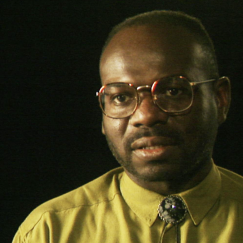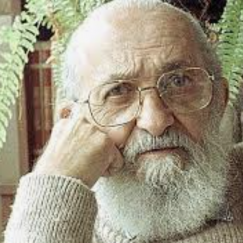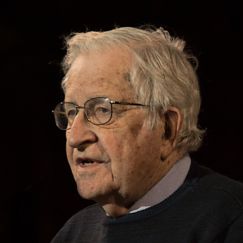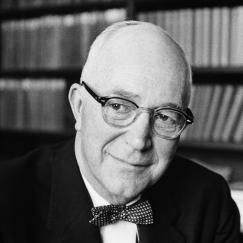The opportunistic teacher who embraces the leisure interests of his pupils in the hope of leading them to higher things is as frequently unsympathetic to the really valuable qualities of popular culture as his colleague who remains resolutely hostile. A true training in discrimination is concerned with pleasure.
Bio/Short Description
Gordon Allport remains one of the most influential, oft-cited, and leading social psychologists of the twentieth century. His scholarship is marked by its empirical rigor, breadth, pluralism, social impact, and ethical concerns; he boldly experimented with new methodologies and topics of study with the aim of bringing about social change. His landmark books, The Psychology of Radio (with Hadley Cantril; 1935), The Individual and His Religion (1950), and The Nature of Prejudice (1954), created a paradigm shift that enabled future researchers to make significant developments in the field.
In the 1930s, Allport was the first major scholar to examine the socio-psychological effects of mass media by conducting research on popular radio. Radio emerged as a powerful medium during this time, dramatically affecting the sociocultural, political, and economic milieu. By 1935, when Allport and his former student Hadley Cantril coauthored their pioneering book, The Psychology of Radio, almost 70 percent of U.S. households had a radio set and close to 78 million Americans were dedicated listeners (Cantril and Allport 1935; Pandora 1998). For the first time ever, broadcast programs could reach mass audiences from various regions, social classes, races, and ethnicities.
Allport’s choice of examining contemporary popular culture through his research on radio was pathbreaking and radical. During his time, psychologists were modeling their research agendas on the pure sciences by focusing on scientific objectivity, academic pursuits, and theoretical contributions (Pandora 1998). The Psychology of Radio (Cantril and Allport 1935) stands as a classic example of how social-science scholarship can connect to the wider social arena, contemporary social issues, political activism, and social democracy. By declaring that “the really important problems of the radio are now psychological problems” (4), Cantril and Allport were setting the foundation for the new applied field of media psychology and legitimizing it as a valid field of serious scientific study. Cantril’s (1940) detailed analyses of the effects of the radio broadcasting of the Martian invasion continues to be used by present-day media-effects scholars to highlight the situational contexts that lead to powerful effects of radio on mass audiences.
Allport’s research on stereotyping, intergroup relations, personality, radio studies, and religion continue to influence media scholars even today. Allport took a pragmatic and applied approach to the social sciences, one that was deeply rooted in the political, cultural, and social issues of his times. He had a broad approach to psychology that accommodated multiple theoretical and methodological perspectives. He embraced major theories from a variety of fields, such as anthropology, sociology, theology, literature, and history. Although he was an experimental social psychologist, Allport was fascinated by biographies and case studies, both from a literary and scientific standpoint, throughout his life. A Review of General Psychology survey, published in 2002, ranked Allport as the 11th most cited psychologist of the 20th century.
HOW THEY INFLUENCED YOU?
Videos
Other Grandparents
 Marlon Posted By: Renee HobbsOn:11/29/2023 - 00:56
Marlon Posted By: Renee HobbsOn:11/29/2023 - 00:56
 danahPosted By: Yonty FriesemOn:01/06/2023 - 07:34
danahPosted By: Yonty FriesemOn:01/06/2023 - 07:34
 PaoloPosted By: Renee HobbsOn:07/22/2021 - 16:11
PaoloPosted By: Renee HobbsOn:07/22/2021 - 16:11
 NoamPosted By: Renee HobbsOn:05/23/2020 - 03:48
NoamPosted By: Renee HobbsOn:05/23/2020 - 03:48
 Jon Posted By: Renee HobbsOn:05/10/2020 - 00:12
Jon Posted By: Renee HobbsOn:05/10/2020 - 00:12



Srivi Ramasubramanian
As a child growing up in India, I witnessed how color TV became popular in the 1980s and how satellite television dramatically affected our family media habits in the 1990s; as a young adult, I witnessed how the rise of digital and social media in the new millennium drastically shifted the nature of mediated communication.
By focusing my scholarship on the stereotyping effects of popular media, I was following the path pioneered by Allport and Cantril (1935), which was then furthered by media psychologists Dolf Zillmann and Jennings Bryant (1994; 1986) in the second half of the twentieth century. These founding figures of the media-effects tradition examined how popular culture and media entertainment influenced audiences’ attitudes and behaviors. When I arrived at Pennsylvania State University to get a Ph.D. in interdisciplinary mass communication, I was fortunate to inherit this rich legacy of empirical rigor, social-science research methods, and media-effects theories when I was adopted into the academic lineage of the Zillmann-Bryant school of media psychology as the first advisee of Mary Beth Oliver and as a student of S. Shyam Sundar.
My family history is rooted in research and practice in media and communication. A contemporary of Allport’s on another continent, my great-grandfather P. Vishwanatha Iyer, a journalist and freedom fighter, was working as an associate editor of a leading national newspaper, the Hindu. Although I never met him, his inspirational rags-to-riches story played an important role in shaping my decision to choose communication as my major. He pioneered research on media history in India by editing several volumes, including The History of Indian Journalism, which remains an important reference collection. When Mahatma Gandhi walked across India from village to village to resist salt taxes imposed on the common people, my great-grandfather Iyer joined this civil disobedience movement and wrote about it for the Hindu.
Gandhi’s effective communication efforts toward raising consciousness among colonizers and unifying and mobilizing Indian citizens to fight for their freedom using nonviolent means remain a source of inspiration for people around the world, especially for scholars committed to social justice and nonviolence. Core Gandhian principles such as ahimsa (nonviolence), satyagraha (civil disobedience), and self-sufficiency are founded in universal positive human values. These principles of inclusiveness, diversity, and intergroup harmony have had a significant impact on my scholarship on media literacy.
Guided by Allport’s foundational scholarship on intergroup relations and my great-grandfather’s association with Gandhian values, my scholarship has focused on media literacy, intergroup harmony, and social change. Specifically, my research examines media portrayals of race and gender, the effects of positive and negative stereotypes on audience attitudes, and the effectiveness of counter-stereotypical media exemplars and media literacy training in prejudice reduction. It has theorized about the complex affective, cognitive, and policy-decision–making effects of stereotypes and addressed conceptual issues in media literacy education and prejudice reduction.